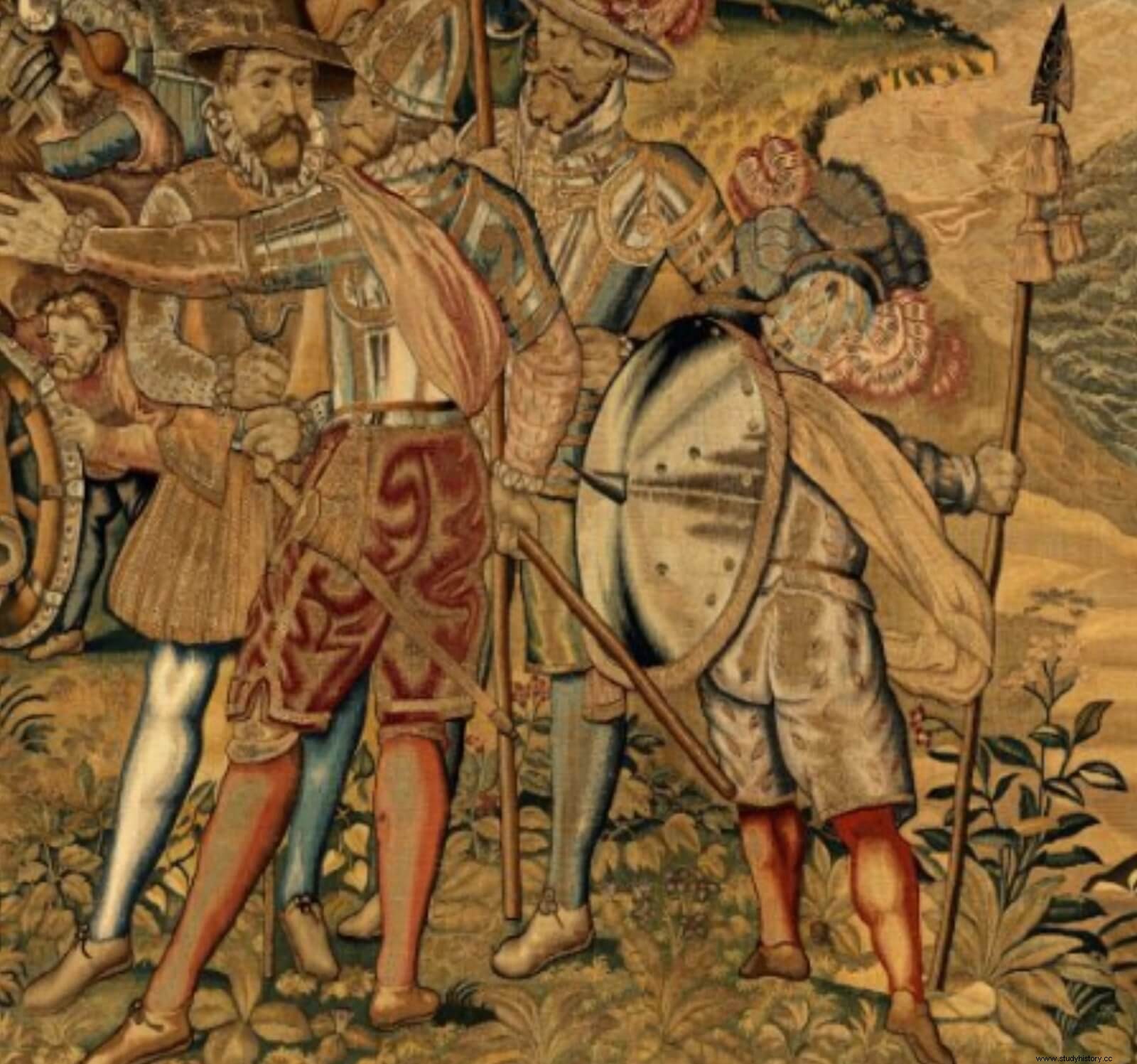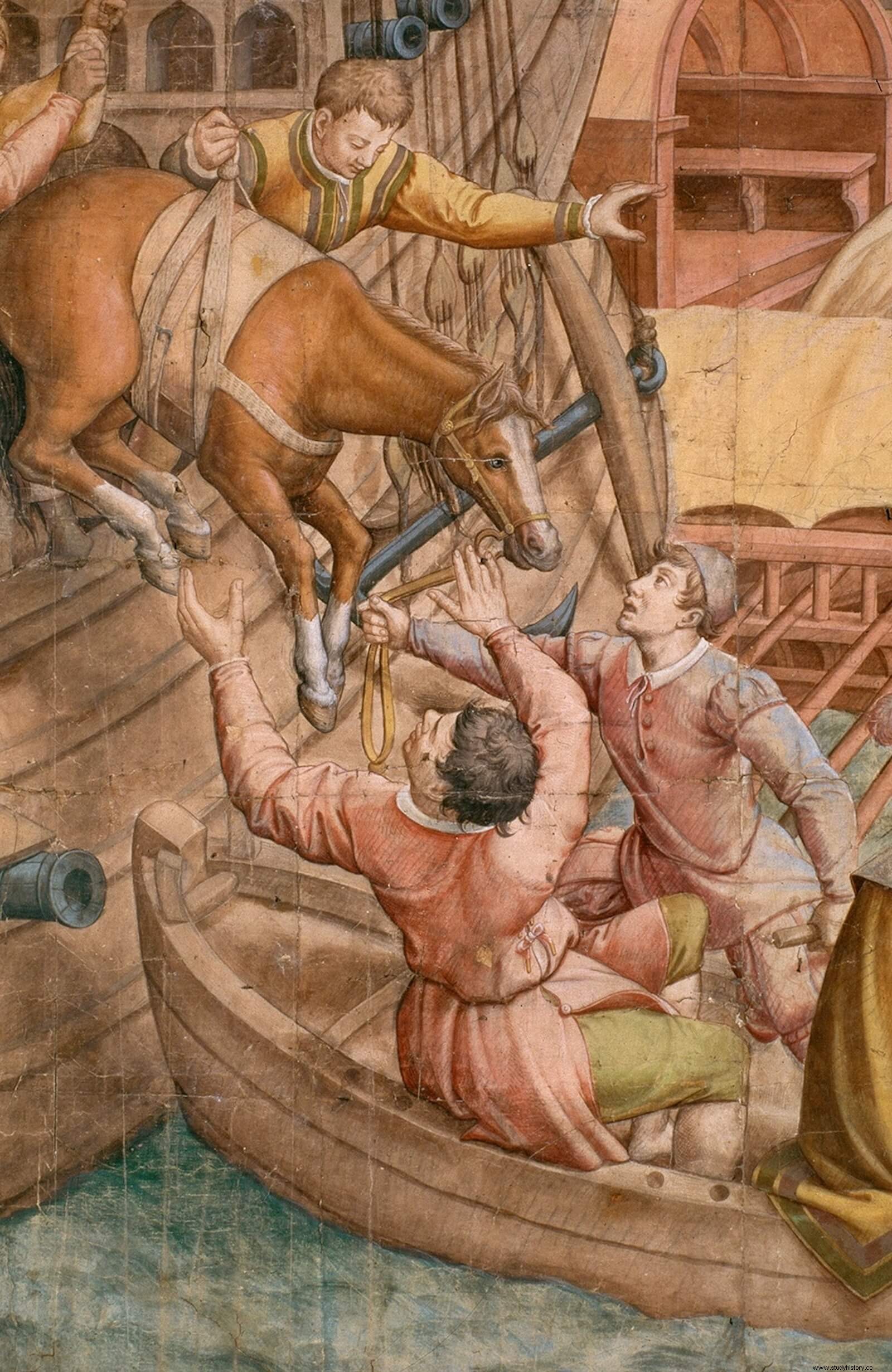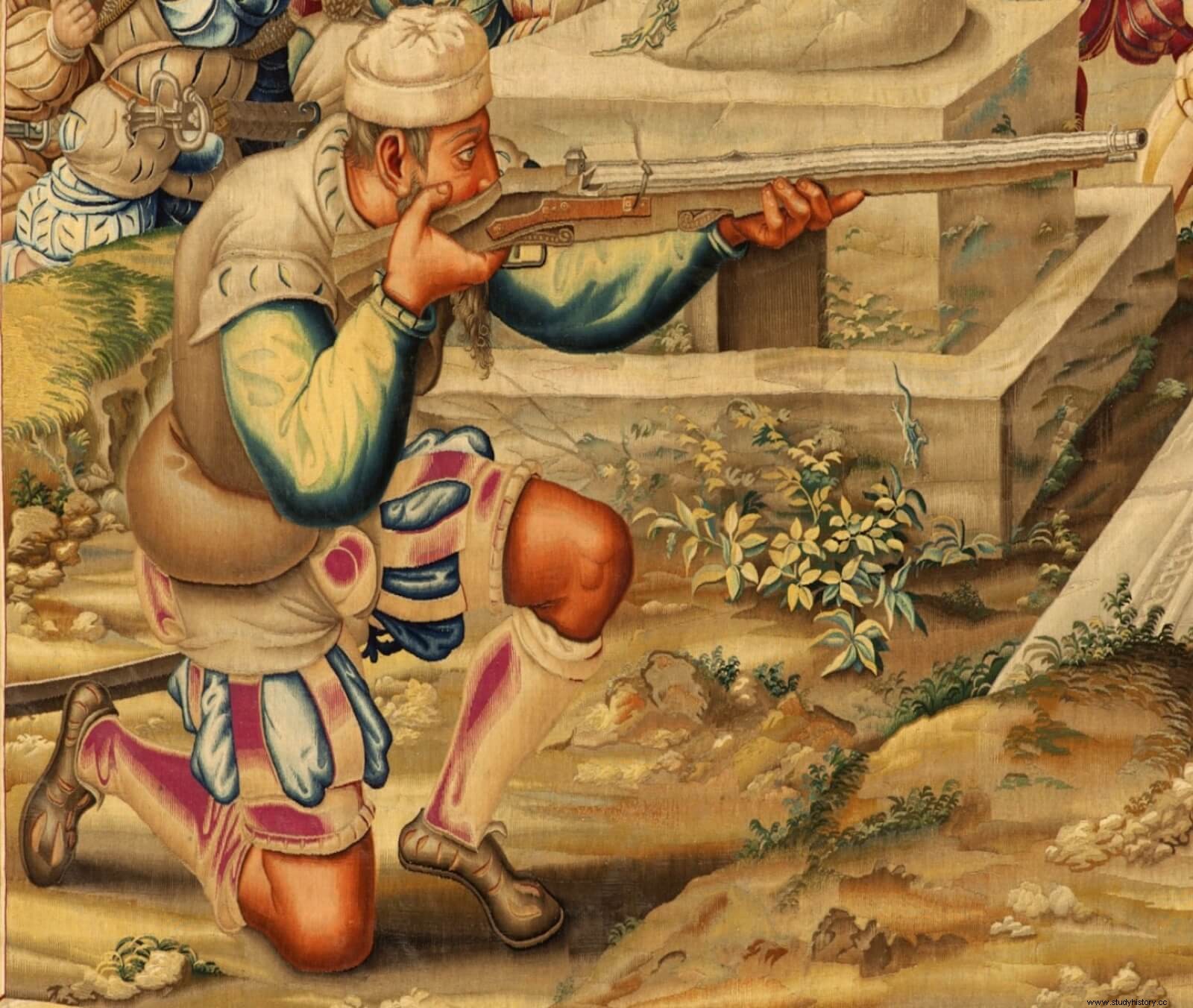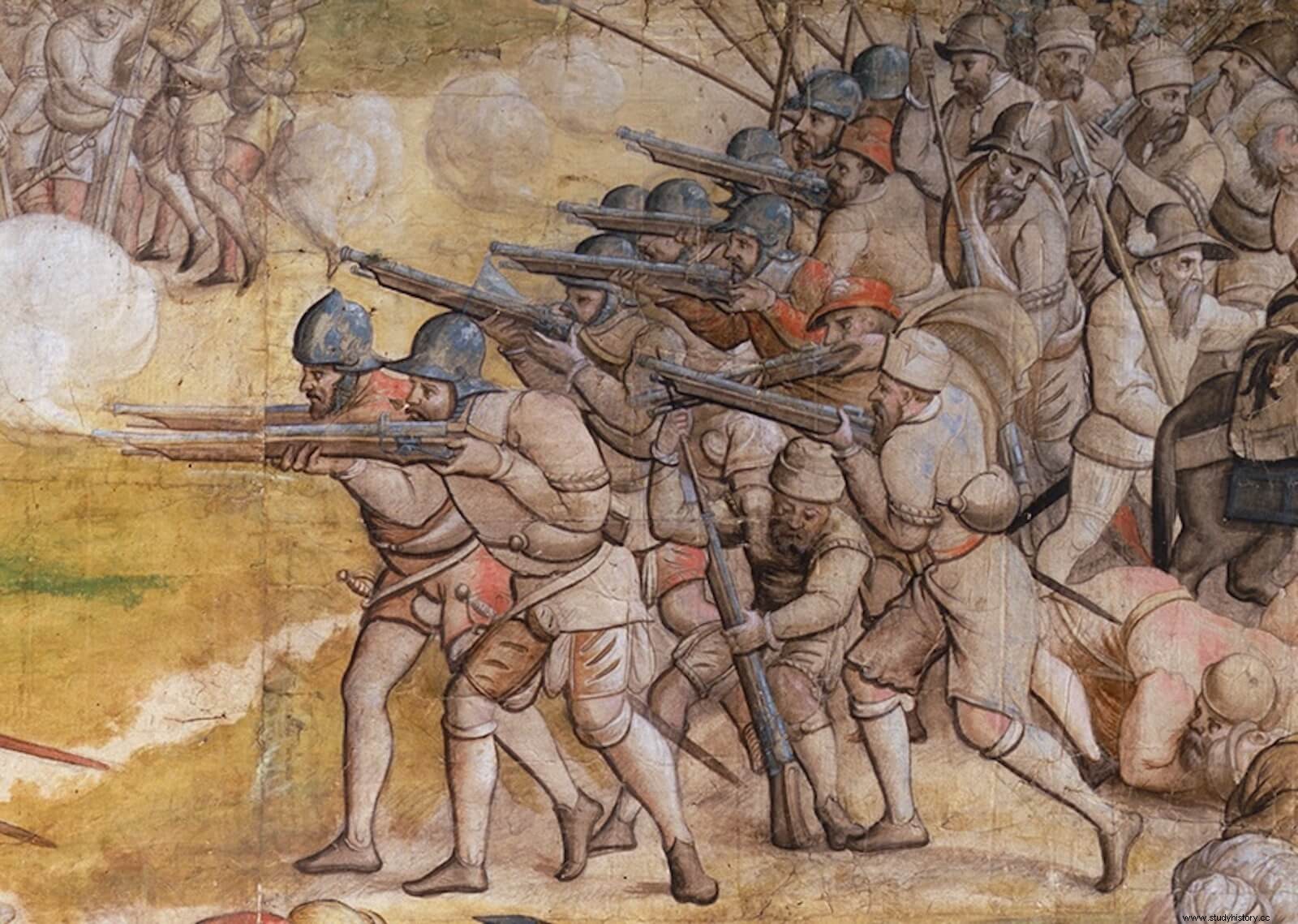
Mozo means young as well as servant; that is, a gentleman of high birth could be a waiter, that is, be of youthful age, and a middle-aged man could be a waiter, since that –horse-handler, spur-handler, chamber-handler, mule-handler, toilet…– it was his job. With the waiters [servants] of the soldiers, fiction on the one hand [1] and a few biographies of soldiers on the other [2], they have penetrated the popular imagination that the waiter or backpacker par excellence he was a young man, an adolescent or even a child, when the truth is that although it is normal for a large part of them to be really quite young, "children who did not reach fifteen years of age", there were also many "boys of competent age », who followed the armies as servants of the soldiers [3].
That competent age, which could be between 18 and 22 years old in the 16th century, would give these young men an important role on occasions, being protagonists of actions that a group of children could not have carried it out without the assistance of older youth, or with the guidance of soldiers, as in the example that Cereceda cites during the siege of Milan in 1526.
Age
This is an order that should be contextualized:after the war with the King of France ended with the Treaty of Crepy, signed in September 1544, Emperor Charles was demobilizing troops of the. Part of them was shipped from Zeeland to Spain, in January of that year in which that order was drafted, and another part – Álvaro de Sande's third – had to go to Hungary. It is certain that the young men under that age had fulfilled their role as servants and surely the only intention was to reduce the number of 'useless mouths' that used to follow all the armies, as well as the number of baggage, before the departure of the third for Vienna.
But it should be noted that it only limited the minimum age for non-Spanish waiters. In other words, being Spaniards it was considered that they should not be fired, we imagine, so as not to be abandoned in Flanders lands far from their homeland and from the only family they had, which were the soldiers they served.
In any case, it is clear that not all the young men were adolescents or even children, although there were children serving the soldiers, and of 'tender age':
“Spanish”
In 1517, after the War of Urbino, someone as practical as the Viceroy of Naples, Ramon de Cardona, wondered how it was possible for 6,000 soldiers to return to the Kingdom of Naples of fortune Spanish from the north of Italy, 3000 more than "who had served in my time in Lombardy" [4].
he responded to himself, saying that «they can only be horse grooms from Rome and other Italians Spanish who have joined them."
He, in his time, kicked out "raptors, people who weren't meant to serve in the army and the Italians", and so it should be done again to excuse the expense of entertaining them in the pay of the King of Spain.
Thus, one way, not only to make a career in the army, but to become a naturalized Spaniard, was to serve as a soldier's waiter. Obviously, the earlier you start, the easier it will be to become Spanish.
Without archival data, it is difficult to estimate what percentage of foreign soldiers would serve in Spanish companies [5], although there are early ordinances, such as that of 1536, in which He warns against firing those from another nation, with the exception of the Burgundians, Italians and Sardinians who "have been serving for a long time."
How many of these would start as young men is mere speculation, but the truth is that many Spanish soldiers took young men in the lands where they served, whether these were friends or enemies, and the only but The military authorities had in this regard was to take young men in Barbary, for the fact of being infidels and in their time, to take young men in Protestant lands.
Some authors cite as a possible origin of the very Spanish word 'pícaro', the French word picar(t) –'picardo'– referring to the inhabitants of Picardy, because in this The imperial army was roaming the region in 1544 and many local rogues would have ended up as foot soldiers becoming the prototype of this mixture of idler and hustler.
Be that as it may, the Spanish soldiers took young men from the lands where they camped, and these, over time, could end up serving as soldiers, Spanish or Spanish.
Servants and relatives
As servants, the waiters had various tasks:water carriers, baggage handlers, backpackers, in domestic service, cooking, or cleaning, running errands, going to buy provisions, doing forager jobs [mainly for cavalrymen, but also for mounted infantrymen who needed fresh hay to feed them], etc.

Also, when the army walked they could – at least in friendly lands– occupy the position of their masters in the line and carry their weapons, during the journey, but never during departure or arrival at a village, during which time the soldier had to occupy his position with his weapons. This, despite the ordinances contrary to this practice [6].
As chestguards, they had the specific task of serving their masters by arming them, that is, helping them put on defensive weapons, the various pieces of the chestguard.
Then, they had tasks, let's say not ordinary, but very necessary, the main one being to get food when their masters could not pay for it or when there was nothing to buy even if there was money, many times , of course, stealing it where necessary.
Also, once the battle was over, or a stronghold was taken, they looted, obtaining loot that they would deliver to their master, retaining a part, or being rewarded for it. Evidently, the corpse stripper task was also included. , a facet that some historians had reserved for campers and followers of the army:
At a given moment, for example, during a siege, they were considered, like the women and families of the soldiers, 'useless mouths', that is, people who ate without doing service. They were given a smaller ration, and could even be expelled from the encircled stronghold, normally with the enemy's pact, although the enemy could not allow the exit to increase the pressure on the defenders and surrender them by hunger in less time. /P>
The young man, like all those who 'served and followed' the army, was subject to military discipline and could be flogged, beaten or robbed. It does not seem that heavier penalties were reserved for them, but it should also be taken into account that many of the offenses they committed would be done on the orders of their masters, against whom their word was worth less.
The boys were often physically and emotionally mistreated by their masters , something quite normal at a time when repeated violence, including intra-family violence, was tolerated or considered corrective and not abuse.
That is why it was usual for them to look for more benign masters, and find them within the same army, an action reprehensible for discipline and good order.
The soldiers traveled by land with their wives, children and servants, and there were only more or less rigorous restrictions in the case of embarking on an army, where for reasons of space and food, limitations were placed on boarding.
At the end of a few years, of course, clubs included, they were like family and many soldiers sponsored their servants to enter the military.
Almost Soldiers
Mozos were not commonly assigned any military role, however there are many examples of actions, such as the one described by Carlos Coloma in the previous example, which are typical of soldiers . The young men who worked as spenders during the sieges could be paid one real per day, which was not little.
Alexander Farnese, in 1580, ordered the troops to storm Ghent through the breach in the wall «and then, in good order, the backpackers of the army followed with lit fires; and as the soldiers entered killing and destroying as many as they came across, they set fire to the houses to secure their backs».
One thing they did do regularly was participate in the sacks when a stronghold was taken , in the looting when the enemy baggage was taken, and in the 'scopes'. Violence was inevitable in the sacks, since the houses of the inhabitants of the taken towns were broken into and with a greater or lesser degree of force, their belongings were stolen. In the looting, the waiters could attack the people of the baggage, that is, women, campers and servants like themselves. The scopes involved a high level of violence, and although the main objective was to capture enemies and steal their possessions or, being accountable people, hold them for ransom, the normal thing was to literally slaughter their throats , the victors ran to slaughter the soldiers who had lost the battle, dagger in hand.

Another action that seems to have had some importance, even tactical , was to make the young men form a squad so that the army would appear to have more troops:
The boys, of course, were almost soldiers for good, and for bad, and sometimes they received the wrongness of the enemy's fury:
In the end, of course, many ended up making merits and getting involved in such a way that some ended up being singled out for actions of war «so that not only did the commander order them to establish plaques, but it gave them advantages.”
Dead squares
Since the deal was clear, the company officers, often in collusion with the salary officers and to the detriment of the king and the army, passed the samples to the boys as if they were soldiers. They lent them weapons and with the habit of an infant they passed them in the sample. And this was public and notorious, and although exemplary punishments were made from time to time, a certain fraud was tolerated.
To pass the sample, of course, they couldn't be teenagers.
Curiously, in the only sample that I have [7] two young men appear as soldiers, like this, with that title and in one case, without even their own name:"Antonio del Puerto, moço del notano" and a "Moço de Francisco Velles" (probably Vélez, since a soldier with that name and surname appears on the same list).
Number of waiters who follow a third
Between Londoño's recommendation –one young man for every ten soldiers and one young man for each officer– and what the mutinous soldiers of 1538 considered –one young man for each corselet, and a waiter for every two soldiers of other arms, whether they were arquebusiers or unarmed pikes– it goes a world:from 53 young men per company of 300 men to about 170.
Typically, soldiers ended up with as many boys as they could keep, depending on their ability, more than any other organizational imperative.
Thus we can see the 5000 young men who controlled Milan in 1526 (see the example at the beginning of the article).
In 1532, in the imperial army that departing from Italy went to rescue Vienna from the Turkish threat, an eyewitness counted 26 flags of 400 Spanish infantrymen each (10,400 soldiers ) with 6000 women and young men. Cereceda reports that the same army had 2,500 women, so the number of young men can be deduced from 3,500. One young man for every three soldiers.
It was said that the soldiers of Cristóbal de Morales's Tercio who left Lombardy in 1538 for Hungary had "3,000 pieces of baggage", between 1,800 and 2,000 men, that is, , which between women, children and young men carried about 1000 people.
Osorio de Angulo, captain of the third of Sicily, left for Vlissingen with three infantry flags, and there, with an armed hand, the citizens did not want to receive them "because of being , with officers and young men, a thousand and five hundred mouths, and the furriel gave a local bourgeois a slap over the dispute and words they had, whether they could be so many mouths or not». In other words, nine hundred soldiers at most, they had about 600 young men, because women are not counted here.
It can be estimated that the number of young men would be one for every four or five soldiers, depending on geography and time, their number growing not only with the prosperity, but also with the permanence of units in a certain territory, and decreasing in transit, live war or armed.
That is, 2,000 servants for 10,000 soldiers, this in an army, which is the 'place' where fewer servants were taken for logistical reasons. We therefore have a forecast of one servant for every five soldiers.
Conclusion
The young men played a fundamental role in the armies of the 16th century :Neither the soldiers were willing to dispense with their services, despite the logistical difficulties, in terms of accommodation and food, nor did the army chiefs contemplate that the Tercios could function without them.

A waiter, just a child, could enter the service of his master in Spain being the latter and leaving with him to Italy, and then to Hungary, France, Germany, Flanders or Barbary, and while his master was gaining experience, learning the vicissitudes himself, not only of his job as a servant , but those of the soldier, cleaning and polishing the pieces of the corselet, or carrying his lord's musket. He also learned what war was and how an army worked, and not a trivial thing for someone whose life was the military, getting used to it, even being a participant in the violence necessary in the soldier's job. Therefore, a young man could reach 20 years old, a good age to serve in the army, having sucked the milk of war from a very young age, and hardly knowing any other life than the one in the army.
he could also, most likely, for logistical reasons, be taken into service once his master was stationed at his destination. These local young men would learn the language of their masters, their uses and customs, and in a few years, they could be one more and sit as a soldier in the Spanish infantry, and march as a soldier to other geographies where they would be seen by the locals. like another foreigner. In Italy, in early times, not only the testimony of Viceroy Cardona, speaks to us of an amalgam of Spanish soldiers and Italian waiters who became, in turn, infantrymen in Spanish companies. Ladero Quesada's work also points to the Italianization of the Spanish military in Naples at the time of the Great Captain, with companies with up to 40% Italians.
Other boys would be Picard boys, German children or Hungarian teenagers , that for a campaign or two they would serve those Mediterranean soldiers, and fill their bellies in their service, robbing the countrymen in occupied lands under the iron hand of the invading or defending army. And later, when their masters embarked for Spain, or went to Italy, they would be fired, without further ado.
Whatever the experience, origin and age of these boys, there is no doubt that there was an opportunity to join the army as soldiers. Opportunities to learn the trade, even from a distance, or sometimes, in live war, as participants in raids, looting or defense works, gave them a unique experience. A novice from Spain would know less than them, and besides, he was months [8] away. Why not take advantage of that workforce? Alonso Vázquez points out a small problem:national loyalty, or the heresiarchal whims of some of these Spaniards.
In any case, even if it was preparing a pot, cutting down orchards to prepare a fire or cleaning a morion, and the young man returned to civilian life at the dawn of his adulthood , his role in the army was important. Perhaps, in part, because it exempted the soldier from tasks that did not require his job , reserving for other more important, typical of the trade of arms. Perhaps, also, due to the abundance of child labor of the time, in which children were not educated in the first letters, nor could they remain idle, and any officer, whether he was a mason or a carpenter, not only had apprentices, but also had with waiters who did various tasks, such as the much-needed water carrier.
Notes
[1] I am referring, of course, to the saga of adventures starring Captain Alatriste, who began in the military as a backpacker, narrated, in turn, by the backpacker of the 'captain', Iñigo Balboa.
[2] It is said that the famous Julián Romero began his career as a backpacker or drummer.
Although Lope de Vega attributes such office to him in a play, the playwright could well be well informed and if, as stated in his file [AHN. Inquisition. Toledo. Leg 359. doc 1223, Cited by his biographer Antonio Marichalar] "being the said Julián Romero fifteen or sixteen years old, he left this town with certain warriors" is that being so young in 1534 he would hardly have been a soldier , and marching in the company of them, he could not find another trade than that of waiter.
However his career began, certainly from the lowest echelons of the militia, he was a famous field marshal and ended up as a member of the Flanders council of war.
[3] The two quotes are from the soldier writer Carlos Coloma, in The wars of the Low States from the year one thousand five hundred and eighty-eight to the year one thousand five hundred and ninety-nine.
[4] Letter from Ramón de Cardona, Viceroy of Naples, to the Holy Caesarea and very Catholic Magestad. October 5, 1517. BNE. MSS/20210/11/1 sheets 7 and 8.
Cardona's numbers:
- In the last payday, 2,860 were fired
- 700 remained in Brescia and Verona
- 500 went to Spain in the ship of Bernat Rivas de Palermo
[5] Raymond Fagel gives the figure of 75 foreigners for three Spanish companies in 1546. A tenth, then, were not Spanish, and were 'mixed with each other'. others' 28 French, 13 Italians, 5 Germans, 11 Low Germans, 7 Burgundians and 1 Lotharingian.
- De Hispano-Vlaamse Wereld. From contacten tussen Spanjaarden in the Nederlanders, 1496-1555 Raymond Fagel. Brussels [1996].
[6] Article 19 of the Metz Army Ordinance [1552]
«Likewise, we command and order that all persons who are not soldiers in order to go in a squad cannot go or go except with the baggage following the flag that will go with the baggage under penalty of three rope deals and being robbed».
[7] Electronic courtesy of Professor Raymond Fagel, who very diligently attended to a query I made to document another article, and who sent me a part of his final year project.
De Spaanse enseignes, van de graaf van Buren in 1546 (ARAB, Audiëntie, 2811)
[8] Although the journey from Cartagena or Malaga to Naples or Genoa, the 'typical' journey that a novice from the 16th century, and even from the 17th, could take less than ten days, it was necessary to take into account that the process took months:the viceroy, governor or ambassador notified the king of the need for troops. The king granted patents of captain and certificates to be able to recruit. The captain, who was normally in court to get the job, went to the recruitment area, appointed his officers, arrived at one of the towns where the recruit was made, showed the authorities, corregidores, others, his identity card. He played drums, recruited 7, 8 or 12 soldiers and went to the next town, where he did the same. Afterward, with the company together, he moved to the port of embarkation. This, done 'quickly', could take between 3 and 4 months, although on exceptional occasions – recruitment in areas near the port and economic hardship in the area that encouraged recruits to enlist – it could be done in a matter of 7 or 8 weeks.
